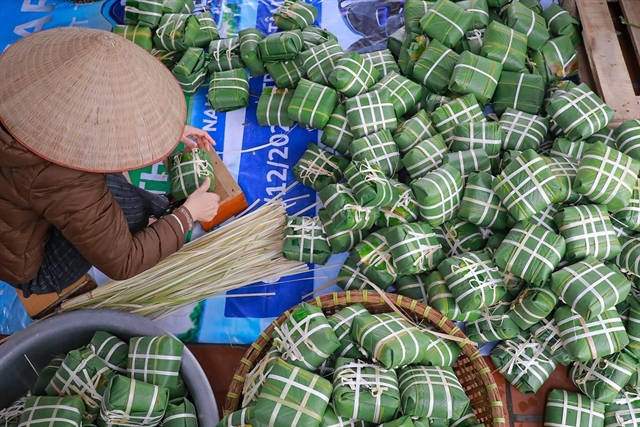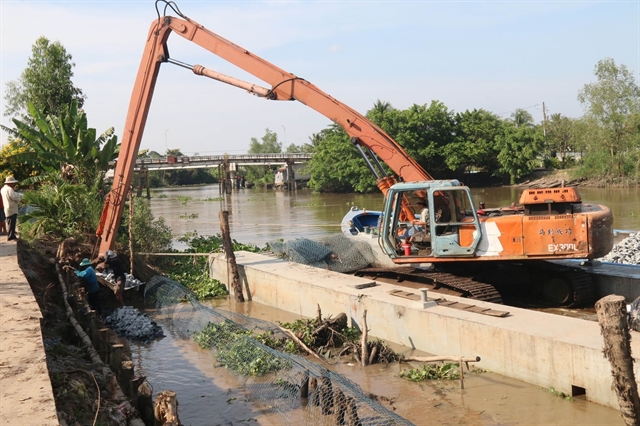 Society
Society

 |
| Tiền Giang Province builds an embankment to prevent erosion along the west bank of the Ba Rày River in Cai Lậy District. — VNA/VNS Photo Minh Trí |
TIỀN GIANG — Tiền Giang Province is taking measures to prevent and control the impact of drought and saltwater intrusion in the coming dry season.
The Cửu Long (Mekong) Delta province, which is the country’s largest fruit producer, is normally affected by saltwater intrusion from sea through river mouths in the dry season which normally occurs between December and April.
The province has been implementing construction projects and non-construction projects to protect nearly 180,000ha of farmland and supply sufficient clean water for 1.3 million people in the 2022-23 dry season.
Lê Minh Hữu, director of the Irrigated Agriculture Branch of Tiền Giang Irrigation Work Exploitation and Management One Member Ltd. Co. in the Cai Lậy-Cái Bè region, said the branch is operating sluices and dams properly, and increasing the operational efficiency of irrigation works of the Ba Rày River’s east and west bank projects.
The two projects will protect more than 8,200ha of specialty fruits, mostly durian grown for export, in the town of Cai Lậy and Cai Lậy District.
The Ba Rày River’s east bank project has a 38km erosion prevention embankment and 17 sluices, and these works help protect more than 4,640ha of fruits.
The Ba Rày River’s west bank project has a 39km embankment, 33 irrigation canals and 32 sluices.
According to the province’s Centre for Hydro-Meteorology Forecasting, saltwater intrusion with a salinity of four grammes per litre can enter 10-20km deep into river mouths next month, and 25-35km in the first two months of next year.
The levels of saltwater intrusion are expected to be equal to the last dry season, said the centre.
Most plants can only tolerate water with a salinity of less than one gramme per litre.
The provincial People’s Committee has asked relevant departments, agencies and localities to implement advocacy activities to enhance public awareness about weather conditions, saltwater intrusion, drought and forest fires in the 2022-23 dry season.
It has instructed localities to inspect, repair and upgrade saltwater prevention works and store irrigation water.
In the coastal district of Gò Công Đông, local authorities have set up plans to protect agricultural production and ensure the supply of clean water for locals.
Lưu Thị Hồng Anh, deputy chairwoman of the Gò Công Đông People’s Committee, said the district has 12,380ha of winter-spring rice, vegetables and fruits which need to be protected from saltwater intrusion and drought.
The district People’s Committee has instructed farmers to finish sowing the winter-spring rice by the end of this month to avoid saltwater intrusion and drought at the end of the crop.
The district has repaired saltwater prevention sluices, and regularly informs the opening and closing times of such sluices so farmers can take fresh water to irrigate their crops.
It plans to open 35 public tap water sites during the first five months of next year to provide free clean water for locals in areas with shortages of fresh water.
Local authorities and farmers living along the Tiền River, a tributary of the Mekong River, have dredged irrigation canals, dug wells and consolidated embankments and sluices to protect crops and fruit orchards.
Farmers have stored fresh water in orchard ponds and built embankments around their orchards.
Dương Văn Đây, who has a 2ha durian orchard in Cai Lậy District’s Ngũ Hiệp Commune, said farmers have dredged irrigation ditches in orchards to store more irrigation water and consolidated orchard embankments.
He has also dug one new well and upgraded four existing ones to take water for farming and household use, he said. — VNS




